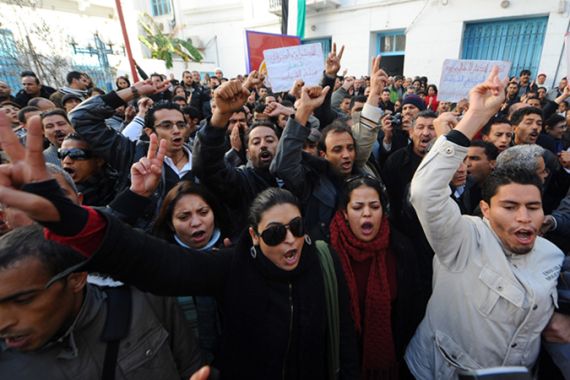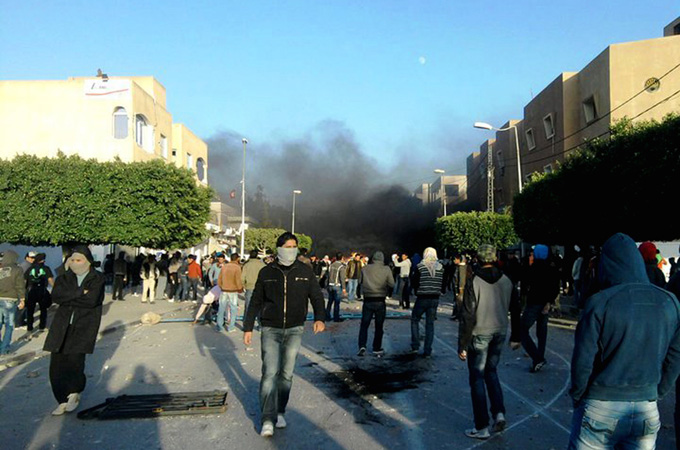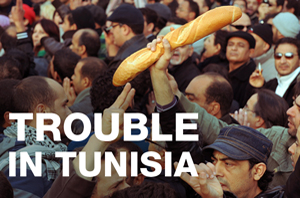Timeline: Tunisia’s uprising
Chronicle of nationwide demonstrations over the country’s unemployment crisis.

 |
| Unrest broke out after a young man tried to commit suicide in frustration over rampant unemployment [EPA] |
December 17: Mohammed Bouazizi, an 26-year-old man trying to support his family by selling fruits and vegetables in the central town of Sidi Bouzid, douses himself in paint thinner and sets himself on fire in front of a local municipal office.
Police had confiscated his produce cart because he lacked a permit and beat him up when he resisted. Local officials then refused his hear his complaint. He is taken to a hospital near Tunis for treatment of his third-degree burns.
Bouazizi’s act of desperation highlights the public’s boiling frustration over living standards, police violence, rampant unemployment, and a lack of human rights. The protests begin in Sidi Bouzid that same day. They quickly spread across the region, then the country.
December 20: Mohamed Al Nouri Al Juwayni , the Tunisian development minister, travels to Sidi Bouzid to announce a new $10 million employment programme. Protests continue unabated.
December 22: Houcine Falhi, a 22-year-old, commits suicide by electrocuting himself in the midst of another demonstration over unemployment in Sidi Bouzid after shouting “No to misery, no to unemployment!”
December 24: Mohamed Ammari, an 18-year-old protester, is shot and killed by police during violent demonstrations in the central town of Menzel Bouzaiene.
Chawki Belhoussine El Hadri , a 44-year-old man, is among those shot by police at the same protest.
Hundreds of protesters rally in front of the Tunisian labour union headquarters over rampant unemployment, clashing with Tunisian security forces in the central towns of al-Ragab and Miknassi. Skirmishes break out when security forces stage overnight crackdown campaigns.
December 25: Rallies spread to Kairouan, Sfax and Ben Guerdane.
|
|
An interior ministry spokesperson says police were forced to “shoot in self-defence” after warning shots failed to disperse scores of protesters who were setting police cars and buildings ablaze.
December 27: Police and demonstrators scuffle as 1,000 Tunisians hold a rally in Tunis, the capital, calling for jobs in a show of solidarity with those protesting in poorer regions. Demonstrations also break out in Sousse.
December 28: Zine El Abidine Ben Ali, the country’s president, warns in a national television broadcast that protests are unacceptable and will have a negative impact on the economy. Ben Ali criticises the “use of violence in the streets by a minority of extremists” and says the law will be applied “in all firmness” to punish protesters.
The Tunisian Federation of Labour Unions (UGTT by its French acronym) holds another rally in Gafsa province, which is squashed by security forces.
At the same time, about 300 lawyers hold a rally near the government’s palace in Tunis in solidarity with protesters. Lawyers march in several other cities as well.
The governors of Sidi Bouzid, Jendouba, and Zaghouan provinces are dismissed for unspecified reasons related to the uprising, according to the Pana news agency.
The Tunisian ministers of communication, trade and handicrafts, and religious affairs are all sacked for reasons related to the uprising, the Arabiya news channel reports.
Abderrahman Ayedi, a prominent Tunisian lawyer, is allegedly tortured by police after they arrest him for protesting.
December 29: Security forces peacefully break up a demonstration in the northeastern city of Monastir but allegedly use violence in the town of Sbikha. There are also reports of police brutality in the town of Chebba, where one protester is hospitalised.
Nessma TV, a private news channel, becomes the first major Tunisian media outlet to cover the protests, after 12 days of demonstrations.
December 30: Chawki Belhoussine El Hadri, shot by police six days earlier, dies of his injuries.
France’s Socialist Party condemns the “brutal repression” of the protesters, calling for lawyers and demonstrators to be released, and calls on the French government to speak out.
December 31: Lawyers across Tunisia respond to a call to assemble in protest over the arrested lawyers and in solidarity with the people of Sidi Bouzid.
Authorities react to the protests with force, and lawyers tell Al Jazeera they were “savagely beaten”.
January 2: The cyberactivist group “Anonymous” announces Operation Tunisia in solidarity with the protests by striking a number of Tunisian government websites with “direct denial of service” attacks, flooding them with traffic and temporarily shutting them down.
Several online activists tell Al Jazeera that their email and Facebook accounts were hacked.
January 3: About 250 demonstrators, mostly students, stage a peaceful march in the city of Thala. The protest turns violent after police try to stop it by firing tear gas canisters.
At least nine protesters are reportedly injured. In response, protesters set fire to tyres and attack the local offices of the ruling party.
January 4: The Tunisian Bar Association announces a general strike to be staged on January 6 in protest over attacks by security forces against its members.
January 5: Mohamed Bouazizi, who launched the uprising by setting himself on fire two and a half weeks earlier, dies of self-inflicted burns. A funeral is later held for him in Sidi Bouzid, his hometown.
January 6: Reports suggest that 95 per cent of Tunisia’s 8,000 lawyers launch a strike, demanding an end to police brutality against peaceful protesters.
January 7: Authorities arrest a group of bloggers, journalists, activists and a rap singer in a crackdown on dissent.
January 8-12: At least six protesters are reportedly killed and six others wounded in clashes with police in Thala, a provincial town near the border with Algeria. Another three people were killed in similar clashes in the town of Kasserine.
In Thala, witnesses said police fired their weapons after using water cannons to try to disperse a crowd which had set fire to a government building. The crowd has also thrown stones and petrol bombs at police.
Snipers carry out a series of massacres in Kasserine and Thala, violence which shocks Tunisians across the country, laying the seeds for the uprising to become a genuinely nationwide phenomenom.
January 13: The Paris-based International Federation for Human Rights tallies 66 deaths since the protests began, and sources tell Al Jazeera that at least 13 people were killed in the previous two days. The government’s official toll stands at 23, after three and a half weeks of clashes.
Later, Zine El Abidine Ben Ali, Tunisia’s president, makes a televised address, announcing unprecedented concessions and vowing not to seek re-election in 2014. He pledges to introduce more freedoms into society, institute widespread reforms and investigate the killings of protesters during demonstrations. Some formerly blocked or banned websites become accessible.
January 14: Ben Ali imposes a state of emergency and fires the country’s government amid violent clashes between protesters and security forces. He promises fresh legislative elections within six months in an attempt to quell mass dissent.
State media reports that gatherings of more than three people have been banned and “arms will be used if orders of security forces are not heeded.”
That night, reports fly that the army has seized control of Tunisia’s main airport and closed the country’s airspace. Though members of his extended family are reportedly arrested, Ben Ali manages to leave country by plane.
Mohammed Ghannouchi, the prime minister, appears on state television to announce that he is assuming the role of interim president under chapter 56 of the Tunisian constitution.
Ben Ali reportedly flies first toward Malta, then Paris, before finally turning around toward the Gulf, where he lands in Jeddah, Saudi Arabia. French media report that Nicolas Sarkozy, the French president, refused to allow Ben Ali to land in his country.
January 15: Saudi Arabia officially announces that it is hosting Ben Ali and his family for an unspecified period of time.
The constitutional court, Tunisia’s highest legal authority on constitutional issues, rules that Fouad Mebazaa, the speaker of parliament, should be interim president, not Ghannouchi. Mebazaa tasks Ghannouchi with forming a new coalition government.
The power vacuum left by the departure of Ben Ali is exploited by looters and violent gangs, who ransack grocery stores and expensive manors belonging to the old regime, witnesses say.
Residents in several parts of Tunis say that groups were prowling through neighbourhoods at night setting fire to buildings and attacking people and property, with no police in sight.
January 16: Tension and uncertainty grip Tunisia as military forces attempt to restore order.
Imed Trabelsi, a nephew of Ben Ali’s wife, reportedly dies in a military hospital in Tunis. He would have been the first person in the president’s extended family to have died as a result of the uprising, but the Reuters news agency later reports on January 21 that Trabelsi has actually been arrested.
Salim Shayboub, Ben Ali’s son-in-law, is also reportedly arrested.
Rafik Belhaj, Tunisia’s former interior minister and the man many held responsible for a police crackdown on protesters, is arrested and held in his home town of Beja in the north of the country.
WikiLeaks releases a four-part series of US diplomatic cables that shows the United States knew about the extent of corruption and discontent in Tunisia and chose to support Ben Ali regardless.
January 17: Libyan leader Muammar Gaddafi says he regrets the fall of Ben Ali, which has left the country in “chaos with no end in sight.”
Tunisia’s prime minister promises to announce a new coalition government, hoping to maintain the momentum of political progress to ward off fresh protests and also undercut gunmen loyal to the ousted president.
Ghannouchi also announces widespread reforms, promising press freedom, the lifting of a ban on human rights groups operating in Tunisia, and the release of political prisoners.
A new government is announced, but includes several Ben Ali loyalists in key posts – including the defence, interior and foreign ministers – and few opposition members in lesser positions.
Exiled opposition leaders cry foul, saying they’ve been sidelined in the new “unity” government, which favours members of the old guard.
January 18: Unhappy with the lineup of the new government, Tunisians take to the streets in protest.
Other opposition ministers threaten to quit, saying they do not want to be in a government with members of Ben Ali’s former ruling party, the Constitutional Democratic Rally (RCD).
Ghannouchi and Mebazaa resign from the RCD in a bid to placate protesters.
January 19: The Swiss government orders a freeze on all funds held by Ben Ali in Switzerland, Micheline Calmy-Rey, the country’s foreign minister said.
At the same time, prosecutors in Tunisia open an inquiry into the assets of Ben Ali and his extended family, the official TAP news agency reported.
Speaking to Al Jazeera in his first public remarks since the uprising, Gordon Gray, the US ambassador to Tunisia, calls the movement a “work in progress” and a “new phenomenon.”
The UN High Commissioner for Human Rights Navi Pillay said the United Nations plans to send a team of human rights officials to Tunisia to look into weeks of violence and advise the new coalition government.
January 20: All ministers in the interim government quit Ben Ali’s RCD party but remain in their cabinet posts. The central committee of RCD is dissolved, as many of the ministers were also committee members.
January 21: The first of a three-day period of national mourning sees protesters gather peacefully throughout the day in Tunis.
They demand the dissolution of the new government as they honour those who who died in the unrest of previous weeks.
In an effort to dampen the anger, Ghannouchi pledges to quit politics after legislative and presidential elections that he says will be held as soon as possible.
January 22: Thousands of protesters take to the streets yet again, continuing to ask for the removal of all RCD members from the interim government.
Around 2,000 police officers join the civilian protesters, calling for better working conditions and a new union and complaining about their association with Ben Ali’s repressive regime.
Protesters break through barricades at the prime minister’s office, but no violence is reported.
The army and the justice department are ordered to preserve any documents and evidence that can be gathered so the old government can be implicated throughout the investigation.
Rachid Ghannouchi, the leader of the formerly banned Islamist al-Nahda (Reinaissance) party and no relation to the prime minister, is still not allowed to return to Tunisia until a 1991 prison sentence is lifted.
January 23: As the third and final day of national mourning begins, protesters are again expected to take to the streets, after former RCD government ministers showed no signs of resigning.
Hundreds of Tunisians defy a nighttime curfew and travel hundreds of kilometres in what they call a “Liberation caravan” to join protesters in the country’s capital, where anger at the interim government continues to grow.
The country’s state news agency reports that allies of Ben Ali – Abdelaziz bin Dhia, Ben Ali’s spokesman and chief adviser, and Abdallah Qallal, a former interior minister and head of Tunisia’s appointed upper parliamentary house – have been placed under house arrest.
The agency also reports that police are searching for Abdelwahhab Abdalla, Ben Ali’s political adviser, who has disappeared and that Larbi Nasra, the owner of Hannibal TV and his son have been arrested on suspicion of “treason” for working on Ben Ali’s return from Saudi Arabia (where the deposed president currently is currently in exile).
Nasra, the agency reports, is related to Ben Ali’s wife, Leila, and is accused of “using the channel to … create a constitutional vacuum, ruin stability and take the country into a vortex of violence that will bring back the dictatorship of the former president.”
January 24: Politicians are negotiating the creation of a council to oversee the interim government. Its task would be to protect the “Jasmine” revolution that toppled Ben Ali.
January 26: Clashes break out near government offices in the old city, or casbah, where riot police fire teargas at hundreds of demonstrators.
The Tunisian General Labour Union holds a general strike in Sfax, Tunisia’s second city and economic centre, and thousands demand that the government resign.
Tunisia asked Interpol to help arrest ousted president Ben Ali and his family so they can be tried for theft and currency offences, the nation’s interim justice minister said.
January 27: Tunisia’s foreign minister, Kamel Morjane, announces his resignation. The prime minister later announces a reshuffle of the cabinet, dropping key ministers from the criticised government of ousted president Zine El Abidine Ben Ali.
February 1: Snipers carry out a series of massacres in Kasserine and Thala, violence which shocks Tunisians across the country, laying the seeds for the uprising to become a genuinely nationwide phenomenon
A UN investigative panel reports that at least 219 people were killed during the uprising again Ben Ali, a figure it says is likely to rise. Another 510 Tunisians were injured, according to Bacre Waly Ndiaye.
